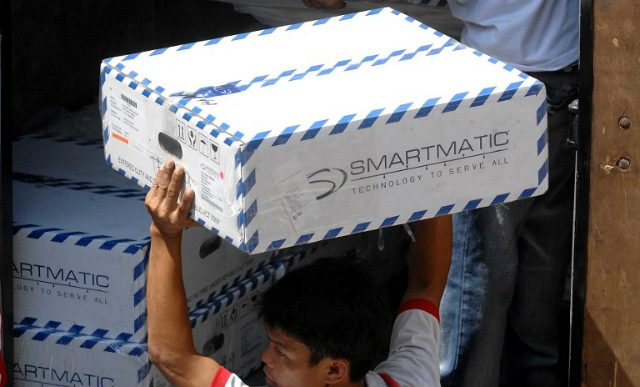SUMMARY
This is AI generated summarization, which may have errors. For context, always refer to the full article.

MANILA, Philippines – Despite calls to blacklist it from election deals, Venezuelan firm Smartmatic moved closer to bagging all major election contracts for the Philippines’ presidential elections in 2016.
The Commission on Elections (Comelec) on Thursday, July 30, said it decided to award to Smartmatic a major contract for the lease of 23,000 vote-counting machines.
The contract for these precinct count optical scan (PCOS) machines is pegged at P1.7 billion ($37.18 million).
Comelec Spokesman James Jimenez said the poll body will soon issue the notice of award to Smartmatic.
The lease of 23,000 vote-counting machines is part of the Comelec’s last-ditch effort to ensure automated elections in 2016. (READ: Comelec fails to meet poll automation target)
The Comelec said it will choose between two options by the middle of August:
- repair and supplement its existing vote-counting machines
- buy 100,000 new ones for the presidential elections in 2016
The lease of 23,000 machines will play a role in both options – either in supplementing the 80,000 existing machines or the 70,000 new ones that the Comelec could also lease.
Smartmatic seems poised, as well, to win another major deal – for the lease of 70,000 new machines.
Jimenez said the Comelec bids and awards committee has recommended giving to Smartmatic the deal for the lease of 70,977 vote-counting machines.
He said the Comelec en banc has yet to approve this recommendation.
Reusing previous system
Will Smartmatic bag the third and last deal?
On Saturday, August 1, the Comelec opens the second round of bidding for the refurbishment of 80,000 vote-counting machines.
Smartmatic, along with two other firms, initially wanted to bid for the project, but didn’t submit requirements because the Comelec “significantly” reduced its budget to P2.074 billion ($45.35 million). The Comelec decided weeks later to jack up the budget to P3.13 billion ($68.49 million).
Quoted by Jimenez, Comelec Chairman Andres Bautista said what is sure, for now, is that the Philippines will use optical mark reader (OMR) technology in 2016. OMR is the generic name for PCOS machines.
“No other system is being considered,” Jimenez told Rappler.
Still, critics have urged the Comelec to put Smartmatic on its blacklist of election-related service providers. They claim that Smartmatic’s PCOS machines can be easily rigged. (READ: Poll watchdog pushes for ‘laptop count’ to replace PCOS)
The Philippines used Smartmatic’s PCOS machines in its first and second automated elections, including the 2010 polls that elected President Benigno Aquino III. The 2016 elections will elect Aquino’s successor.
While the Philippines is bent on using the same technology, however, the Comelec faces at least 3 potential obstacles.
Election watchdogs have filed 3 separate petitions before the Supreme Court against the Comelec’s last-ditch effort to ensure automated elections. (READ: Poll automation faces 3rd Supreme Court petition)
In an earlier news conference, Bautista was asked what he would tell critics amid fears that their actions could derail the 2016 elections.
“I think that’s exactly what I would tell them,” Bautista said. “Your actions could possibly derail the elections in 2016.” – Rappler.com
Add a comment
How does this make you feel?
There are no comments yet. Add your comment to start the conversation.